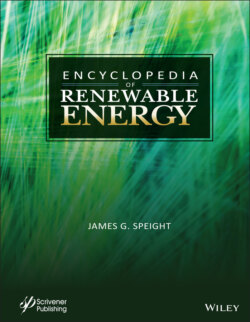Читать книгу Encyclopedia of Renewable Energy - James Speight G., James G. Speight - Страница 190
Biological Action
ОглавлениеBiological action is the action of biological organism on a substrate to produce a product, such as is envisioned in the production of biofuels by biological agents. In a scientific sense, a biological process is a method or means of changing one or more chemical reactions due to the activity of the biological agent which may result in a change in the composition of chemical(s) or material(s).
Although biological actions may involve only one step, often, multiple steps are involved. In the case of multiple steps, the steps may be sequential in time or sequential in space. Also, for a given amount of a feedstock, an expected amount of material can be determined at key steps in the process.
Thus, a biological process or bioconversion process involves the conversion of biomass into bioenergy, fertilizer, food, and chemicals through the biological action of microorganisms. One of the important biofuels obtained through bio-conversion is biogas (which is predominantly methane). In addition, and in the current context, biological processes are those processes that are vital for an organism to survive, and that shape the ability of the organism to interact with its environment. Biological processes involve many chemical reactions or other events that are involved in the persistence and transformation of life forms.
In contrast, the non-biological processes such as (a) direct combustion, (b) conversion of biomass into liquid fuels such as fuel oil (e.g., by pyrolysis - a type of fertilization, liquefaction, etc. ), and (c) gasification.
See also: Bioconversion Platform, Biogas, Biohydrogen, Biological Conversion – Anaerobic Digestion.
